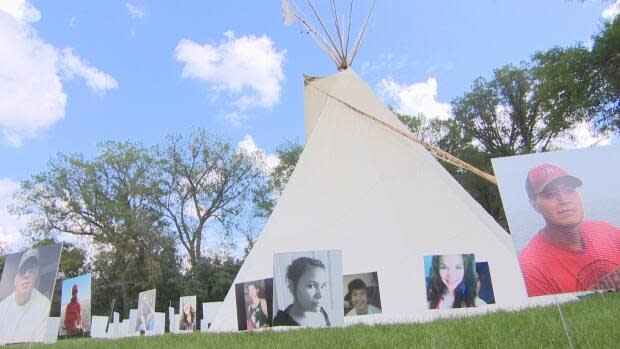Judicial review ends with no further action for Regina judge who visited teepee protest camp

The Canadian Judicial Council (CJC) has decided no further action will be taken after a Regina judge visited a teepee protest camp on Saskatchewan's legislature grounds in September.
Queen's Bench Judge Graeme Mitchell visited the camp after dismissing the provincial government and Provincial Capital Commission's application to remove the teepee from the park.
The CJC's written decision said Mitchell posed for photographs and accepted ceremonial gifts after deciding on the matter, but did not provide reasons for the visit after it became public.
The CJC received five complaints as a result.
The review panel expressed concerns that Mitchell "put himself in a position that was inconsistent with the obligation to remain and appear neutral," according to its decision.
"While the review panel indicated that judicial reconciliation with Indigenous people is and will remain an important goal of the judiciary, it can only be pursued and achieved while respecting judicial independence and impartiality."
However, the panel also looked favourably on Mitchell's efforts to further educate himself on the need to be, and appear, impartial with respect to his rulings.
The panel accepted Mitchell's genuine expression of remorse and his commitment not to put himself in a similar situation in the future.
Mitchell's chief justice also assured the panel of Mitchell's "understanding of the importance of judicial independence on public confidence in the judiciary," according to the decision
As a result, the panel has decided the matter was not serious enough to warrant his removal and it will not to refer the matter to an inquiry committee. Chief Justice Christopher E. Hinkson, chairperson of the Judicial Conduct Committee, also directed that the matter be closed with no further action
Protest camp intended to raise awareness of high suicide rates
Tristen Durocher, a 24-year-old Métis man, arrived in Regina on July 31, 2020 after walking 635 kilometres from northern Saskatchewan and set up a teepee in front of the provincial legislature.
He then began a ceremonial fast that lasted 44 days.
His walk and the following protest camp were intended to raise awareness about high suicide rates in Saskatchewan, especially in Indigenous communities, and call on the government to take action.
In August, Durocher was served with a notice of trespass. The Saskatchewan government and the Provincial Capital Commission (PCC) sought a court order to remove Durocher's teepee from the park, arguing it did not comply with the bylaws of Wascana Centre.
Mitchell ruled that Tristen Durocher would be allowed to "complete his ceremonial fast and vigil without further incident," dismissing the application to remove Durocher's teepee from the park.
"In my view, there should be some criteria, at least, in the bylaws aimed at accommodating and regulating the kind of Indigenous spiritual ceremony and political expression at issue here," Mitchell wrote in his decision.
Mitchell was named a Queen's Bench judge in 2018. He's a former vice-chair of the Saskatchewan Labour Relations Board, spent more than a decade as Crown counsel and then as director of the constitutional law branch of the Saskatchewan Ministry of Justice.
He has taught constitutional law and has appeared before the Supreme Court more than 40 times.

 Yahoo Movies
Yahoo Movies 